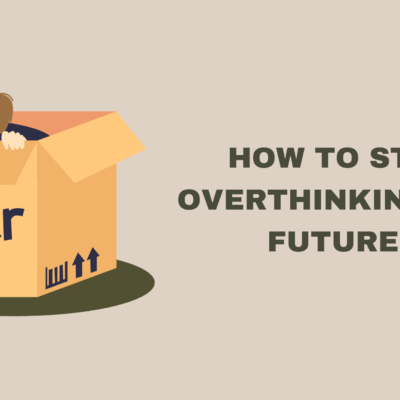How to Stop Overthinking the Future: Overthinking the future is a common struggle. We constantly worry about what might happen, analyzing different scenarios, and stressing over things that are out of our control. While thinking ahead is necessary for planning and setting goals, excessive worrying can lead to anxiety, stress, and even decision paralysis.
If you find yourself caught in the cycle of overanalyzing the future, this article will help you break free. We will explore practical strategies to manage your thoughts, stay present, and create a more balanced mindset.
Also Read:
- How to Lower Your Anxiety Naturally?
- How to Handle Mood Swings?
- Ways to Improve Mental and Emotional Health.
Understanding Why We Overthink the Future
Before tackling the issue, it’s essential to understand why we overthink. Here are some common reasons:
- Fear of the Unknown – The future is uncertain, and uncertainty can be scary. We try to predict and control everything to feel secure.
- Perfectionism – Some people overthink because they want to make the “perfect” decision, fearing any mistake will lead to failure.
- Past Experiences – If you’ve faced failures or disappointments in the past, your mind might try to overanalyze future situations to avoid repeating mistakes.
- Social Pressure – Expectations from family, friends, or society can lead to overthinking about career, relationships, or life goals.
- Anxiety and Stress – Sometimes, our minds are wired to worry, especially if we have underlying stress or anxiety disorders.
Once we identify the root cause of our overthinking, it becomes easier to address it.
The Negative Effects of Overthinking
Overanalyzing the future can lead to several problems:
- Increased Anxiety – Constant worry leads to stress, affecting mental and physical health.
- Decision Paralysis – Overthinking makes it hard to make choices, as you may keep weighing pros and cons without taking action.
- Reduced Productivity – Instead of focusing on the present, you spend time imagining different scenarios that may never happen.
- Missed Opportunities – Fear of making the wrong decision can prevent you from taking risks that could benefit you.
- Emotional Exhaustion – Your brain works overtime, making you feel drained and overwhelmed.
The good news is that with the right approach, you can train your mind to stop overthinking and start living in the present.
Practical Strategies to Stop Overthinking the Future
1. Practice Mindfulness
Mindfulness is the art of being present in the moment. When you focus on what’s happening now instead of worrying about the future, you break the cycle of overthinking.
- Try meditation for a few minutes each day.
- Engage in deep breathing exercises.
- Pay attention to your surroundings—observe the sights, sounds, and sensations around you.
- Focus on one task at a time instead of multitasking.
By practicing mindfulness, you train your brain to stay in the present rather than getting lost in “what ifs.”
2. Set Realistic Goals and Take Action
Instead of overanalyzing every possible outcome, break your goals into smaller, actionable steps.
- Identify what you can control and take action on it.
- Accept that not everything will go as planned, and that’s okay.
- Set deadlines for decision-making to avoid excessive thinking.
Action is the best way to overcome overthinking because it shifts your focus from worrying to doing.
3. Challenge Your Thoughts
Many times, our worries are based on unrealistic fears. Ask yourself:
- Is this thought based on facts or assumptions?
- What is the worst-case scenario, and how likely is it to happen?
- If the worst happens, will I be able to handle it?
Most of the time, we overestimate the negative consequences of our decisions. By challenging your thoughts, you gain perspective and reduce unnecessary worries.
4. Limit Information Overload
In today’s digital age, we have access to an overwhelming amount of information. Constantly researching, reading opinions, or comparing yourself to others can fuel overthinking.
- Set time limits for social media and news consumption.
- Trust your instincts rather than relying too much on external advice.
- Accept that you don’t need to have all the answers before making a decision.
The more information you absorb, the harder it becomes to make clear choices.
5. Adopt a “What Happens, Happens” Mindset
Letting go of the need to control everything is essential. Accept that no matter how much you plan, life is unpredictable.
- Focus on doing your best in the present.
- Accept that failures and mistakes are part of growth.
- Develop resilience to handle unexpected challenges.
By embracing uncertainty, you free yourself from the burden of trying to predict and control every detail of your future.
6. Use Journaling to Organize Your Thoughts
Writing down your thoughts can help you gain clarity and reduce overthinking.
- Make a list of your biggest worries.
- Write possible solutions instead of just dwelling on problems.
- Reflect on past times when things turned out fine despite your worries.
Journaling acts as a brain dump, allowing you to clear your mind and see your concerns more objectively.
7. Engage in Activities That Keep You Busy
Distraction can be a great tool to stop overthinking. Engage in activities that require focus, such as:
- Exercise (running, yoga, gym workouts)
- Hobbies (painting, music, cooking)
- Spending time with loved ones
- Reading or watching uplifting content
The more you engage in meaningful activities, the less time your mind has to dwell on unnecessary worries.
8. Talk to Someone You Trust
Sometimes, discussing your thoughts with a friend, mentor, or therapist can provide a fresh perspective.
- They may offer insights you hadn’t considered.
- Verbalizing your worries can help reduce their intensity.
- They can reassure you that your fears are often exaggerated.
Opening up about your concerns can help you feel less alone in your struggles.
9. Practice Gratitude
Focusing on what you have rather than what you lack shifts your mindset.
- Start a gratitude journal and write three things you’re grateful for every day.
- Remind yourself of past successes and moments when things worked out.
- Appreciate small joys in the present moment.
Gratitude helps rewire your brain to focus on positivity rather than fear of the future.
Conclusion
Overthinking the future is a common problem, but it doesn’t have to control your life. By practicing mindfulness, taking action, challenging negative thoughts, and accepting uncertainty, you can break free from the cycle of worry.
Remember, life is unpredictable, and that’s what makes it exciting. Instead of fearing the unknown, embrace the present and trust that you’ll handle whatever comes your way. Take one step at a time, and soon, you’ll find peace in letting go of unnecessary worries.








